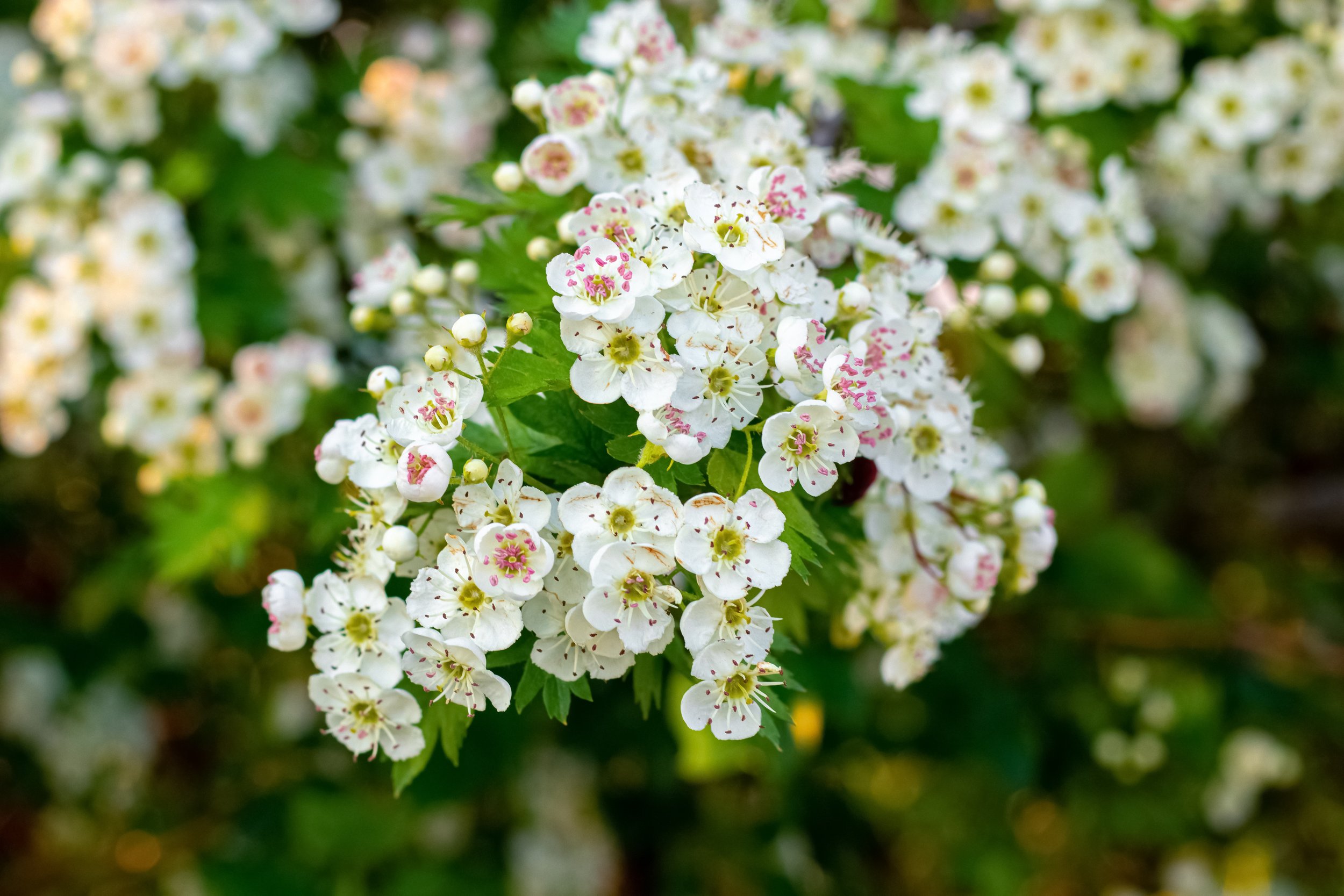Anahata Chai: A Daily Ritual for Healing and Emotional Balance
Hello Friend!
Since our Anahata Chai has become so popular, I thought you might enjoy a little story time around its inspiration, creation, and purpose. Let’s nerd out together!
Initially, my desire when creating this blend was to provide a Hawthorn blend that married into my favorite tea flavors, which is hands down a robust and creamy Chai.
I fell in love with Hawthorn all year with my mentor and our small class. Sitting with the Hawthorn tree through the seasons and learning about all the beautiful magic and medicine she has to offer. I solemnly swear to provide you with a full blog about her someday soon!
Now, in the heart of ancient traditions, chai tells a story of warmth, connection, and wellness. "Anahata," Sanskrit for "unhurt, unstruck, and unbeaten” resonates with the heart chakra, the center of love, compassion, and emotional balance.
In Sanskrit, Anahata translates to "the sound produced without touching two parts," symbolizing a purity or newness that comes when we unplug and view life’s almost contradictory moments and experiences through the lens of an open heart.
The name reflects the open state we find ourselves in when we allow ourselves to embrace the world from a place of non-judgment and clarity—something I believe our world needs much more of.
While Anahata Chai is inspired by traditional chai, it deviates by being caffeine-free and incorporating herbs that focus more on emotional healing, making it a unique, heart-opening variation.
Anahata Chai is more than just a cup of hot tea; it's a symphony of carefully chosen ingredients designed to nurture your heart, both physically and spiritually. Let’s explore the magic behind this blend.
The History of Chai
Chai, a spiced tea originating from India, has roots stretching back over 5,000 years.
Initially, it was an Ayurvedic concoction used for healing, without the tea leaves we recognize today.
The addition of Camellia sinensis came later with British colonization.
For more information on the juicy historical tidbits, I provided a link below that has the potential to turn into a rabbit hole pretty handily, you’ve been warned!
Caffeine-Free vs. Caffeinated Chai
A chai can be a grounding morning ritual or a soothing evening escape. Caffeinated chai, typically made with black tea, stimulates focus and energy, aligning with daytime activity.
In contrast, a caffeine-free chai like Anahata Tea provides a calming experience, ideal for unwinding.
I made the choice to keep Anahata Chai caffeine free to allow the herbs to take center stage, offering their full spectrum of emotional and physical benefits without overstimulating the heart or mind.
I tend to be fairly susceptible to the effects of caffeine. But I am contemplating creating a caffeinated version for those of you that enjoy it! I’d love your thoughts, let me know if you’d like me to stock a caffeinated version for you!
The Heart Chakra: Anahata
The heart chakra, or Anahata, is the fourth chakra in the body's energy system. Located in the center of the chest, it governs love, empathy, and the ability to grieve and forgive.
Anahata's balance fosters harmony in relationships and self-compassion. When blocked, it can manifest as grief, sadness, or feelings of disconnection.
I don’t know about you, but there has been grief in many forms among my personal circle for the last several years. Covid knocked many of us for a big loop in a variety of ways.
In our moments of grief and loneliness this blend has helped to soothe and balance us.
Astrology and Anahata Tea’s Harmony
The ingredients align with celestial energies, creating balance:
Venus, the planet of love and beauty, infuses the tea with its gentle, soothing qualities, fostering emotional healing and self-compassion.
Mars, known for courage and vitality, adds an energetic spark, helping to restore strength and resilience in the face of emotional challenges.
Jupiter, the planet of wisdom and growth, amplifies the tea's ability to open the heart, inviting expansion, clarity, and a deeper connection to one's inner wisdom.
Together, these planetary influences weave a supportive, balanced tea that meets your heart's emotional and spiritual needs, offering both grounding and uplifting qualities in every sip.
The Ingredients of Anahata Chai
Let’s dive in! I love this sh*t!
Hawthorn (Crataegus spp.)
Medicinal Properties: Hawthorn is celebrated in herbalism as a heart tonic. It strengthens cardiovascular function, aids circulation, and supports blood pressure regulation. Energetically, it’s known to heal emotional wounds, acting as a balm for grief and heartbreak.
Astrology: Ruled by Venus, hawthorn resonates with love, beauty, and emotional healing.
Sacred Heart Connection: Hawthorn bridges the physical heart with the sacred, encouraging openness to love and release of emotional pain.
Hawthorne Leaf & Flower
-Known for their calming effect on the nervous system, making them beneficial for stress and anxiety.
Hawthorn Leaf and Flower
Medicinal Properties: These parts of the hawthorn plant are rich in flavonoids, which support the cardiovascular system by improving circulation, reducing blood pressure, and strengthening heart muscles. They are also known for their calming effect on the nervous system, making them beneficial for stress and anxiety.
Astrology: Ruled by Venus, they reflect themes of healing, love, and harmony.
Emotional Benefits: Ideal for addressing emotional wounds, they work gently to uplift and support during times of grief or heartbreak.
Hawthorn Berries
Medicinal Properties: Packed with antioxidants, hawthorn berries help protect the heart from oxidative stress, regulate heartbeat, and promote vascular health.
Astrology: Like the leaves and flowers, they align with Venus’s nurturing energy.
Emotional Benefits: The berries ground and steady the heart, promoting resilience and courage during emotional struggles.
Cardamom (Elettaria cardamomum)
Medicinal Properties: Cardamom soothes digestion, enhances circulation, and uplifts mood. Its warm, sweet aroma is grounding yet energizing. As a whole pod, they release a more nuanced flavor that layers beautifully with the other spices.
Astrology: Ruled by Mercury, it aids communication and connection.
Emotional Benefits: Opens pathways for expressing love and forgiveness.
Cinnamon (Cinnamomum verum)
Medicinal Properties: Anti-inflammatory, it stabilizes blood sugar and enhances warmth in the body, supporting circulation and vitality. Worth noting that the form of cinnamon chips allows for a slow, rich infusion that deepens the tea's warming properties.
Astrology: Ruled by the Sun, cinnamon brings warmth, confidence, and joy.
Emotional Benefits: Provides comfort and a sense of safety, helping to ease grief.
Star Anise (Illicium verum)
Medicinal Properties: Star anise is known for its antimicrobial and digestive benefits. It also helps soothe coughs and colds, making it ideal for heart-centered wellness during emotional or physical stress.
Astrology: Ruled by Jupiter, star anise expands energy and brings a sense of hope.
Emotional Benefits: Its star-shaped form evokes protection and guidance, making it a grounding presence in this blend.
Cinnamon, Star Anise, & Cardamom
Together these three work to soothe digestion, stabilize blood sugar, and boost the immune system
Ginger (Zingiber officinale)
Medicinal Properties: A potent circulatory stimulant and anti-inflammatory herb that warms the body and aids digestion. Ginger granules allow for a concentrated, aromatic infusion that invigorates the heart and stimulates circulation.
Astrology: Ruled by Mars, it embodies energy, courage, and passion.
Emotional Benefits: Activates inner strength and disperses stagnant emotions.
Cloves (Syzygium aromaticum)
Medicinal Properties: Antioxidant-rich and pain-relieving, cloves stimulate circulation and soothe respiratory issues.
Astrology: Ruled by Jupiter, cloves foster expansion and growth.
Emotional Benefits: Promote spiritual awakening and emotional clarity.
Black Pepper (Piper nigrum)
Medicinal Properties: Enhances digestion and bioavailability of other nutrients, warming the body and clearing stagnation.
Astrology: Ruled by Mars, it strengthens resolve and energy.
Emotional Benefits: Encourages motivation and determination to heal.
Rose Petals (Rosa spp.)
Medicinal Properties: Gentle and calming, roses soothe the nervous system and heal emotional wounds. Roses offer softness and a sense of unconditional love that speaks directly to the emotional heart.
Astrology: Ruled by Venus, roses are symbols of love and beauty.
Emotional Benefits: Open the heart to self-love and compassion.
Tulsi Basil (Ocimum sanctum)
Medicinal Properties: Known as “Holy Basil,” tulsi is an adaptogen that helps the body handle stress and supports overall wellness. It strengthens immunity, calms inflammation, and balances energy.
Astrology: Ruled by Mercury and Jupiter, tulsi embodies wisdom, clarity, and expansion.
Emotional Benefits: Tulsi clears emotional fog and invites serenity, helping to stabilize the heart during periods of uncertainty or sadness.
Fennel Seeds (Foeniculum vulgare)
Medicinal Properties: Fennel seeds aid digestion, reduce bloating, and promote hormonal balance. They are rich in antioxidants and have anti-inflammatory properties.
Astrology: Ruled by Mercury and Venus, fennel fosters communication and harmony.
Emotional Benefits: Fennel soothes emotional turmoil, inviting calm and balance to the heart.
Coriander Seeds (Coriandrum sativum)
Medicinal Properties: Coriander is cooling and anti-inflammatory, aids digestion, and helps detoxify the body.
Astrology: Ruled by Mars, coriander symbolizes courage and endurance.
Emotional Benefits: Coriander brings a light, refreshing energy to the blend, helping to lift the weight of sadness and restore joy.
Anahata Chai as a Whole
As you can see, the combination of these ingredients creates a balanced, harmonious blend that supports both physical and emotional wellness.
The warm spices and cooling herbs work together to soothe grief, uplift the spirit, and fortify the heart—making it a true heart chakra ally.
It’s so much more than just a tea; it’s a ritual. The warmth of its spices dissolves sorrow, while hawthorn and rose mend the cracks of grief.
With each sip, it invites you to breathe deeply, reconnect with your inner self, and embrace life’s joys and sorrows with an open heart.
Let Anahata Chai be your companion in healing, a brew that provides a warming hug and gently whispers, "You are loved."
Take care of you, my friend!
Melody
Brewing Instructions for Anahata Tea
Measure: Use 1 heaping teaspoon of Anahata Tea per 8 oz of water.
Boil Water: Heat water to just below boiling (around 200°F) to preserve the delicate notes of the herbs.
Steep: Pour the hot water over the tea and let it steep for 5-7 minutes. For a more robust flavor, steep for up to 10 minutes.
Strain & Serve: Strain the tea into your favorite cup. Add a touch of honey or plant-based milk if desired to enhance the chai's warmth.
Sip Mindfully: Enjoy the tea slowly, allowing its soothing properties to comfort your body and heart.
For a richer, creamier chai experience, brew the tea in a mix of half water and half milk, simmering gently for 10 minutes before straining. ENJOY!
This information is based on established herbalism principles, traditional Ayurvedic and Western herbal practices, and astrological correspondences I’ve found in holistic wellness texts. Some resources I recommended for more nerding out even more:
Khatri, Nhisa. The evolution of chai.
https://storymaps.arcgis.com/stories/1a18c9d521e84d6d8549960e2fed6eb5
The Herbal Medicine-Maker’s Handbook" by James Green – Offers detailed insights into the medicinal properties of herbs. https://amzn.to/3Oqe8RS
"The Complete Guide to Adaptogens" by Agatha Noveille – A great resource for understanding Tulsi and other adaptogens. https://amzn.to/3ZplP13
"The Yoga of Herbs" by Dr. Vasant Lad and David Frawley – Combines Ayurvedic uses of spices and herbs with their energetic and planetary correspondences. https://amzn.to/4eNnz8w
PubMed (https://pubmed.ncbi.nlm.nih.gov/) – For peer-reviewed studies on specific herbs like Hawthorn or Ginger.
NIH’s National Center for Complementary and Integrative Health (https://www.nccih.nih.gov/) – Evidence-based insights into herbs and alternative therapies.
The Astrology Dictionary (https://theastrologydictionary.com/) – Useful for cross-referencing planetary correspondences with plants.
Boring Disclaimer:
The information provided in this blog is for informational purposes only and is not intended to diagnose, treat, or prevent any medical condition. Always consult with a healthcare professional before using herbal remedies, especially if you are pregnant, nursing, or taking medication. The statements made about the properties of herbs are based on traditional use and do not guarantee specific results. Individual experiences may vary.
Amazon Associate Disclaimer: As an Amazon Associate, I earn from qualifying purchases. This helps support the blog and allows me to continue providing valuable content. Thank you for your support!





